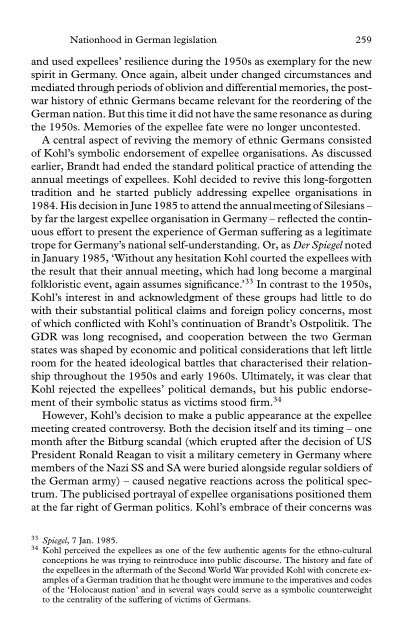Memory and Power in Post-War Europe: Studies in the Presence of ...
Memory and Power in Post-War Europe: Studies in the Presence of ...
Memory and Power in Post-War Europe: Studies in the Presence of ...
Create successful ePaper yourself
Turn your PDF publications into a flip-book with our unique Google optimized e-Paper software.
Nationhood <strong>in</strong> German legislation 259<br />
<strong>and</strong> used expellees’ resilience dur<strong>in</strong>g <strong>the</strong> 1950s as exemplary for <strong>the</strong> new<br />
spirit <strong>in</strong> Germany. Once aga<strong>in</strong>, albeit under changed circumstances <strong>and</strong><br />
mediated through periods <strong>of</strong> oblivion <strong>and</strong> differential memories, <strong>the</strong> postwar<br />
history <strong>of</strong> ethnic Germans became relevant for <strong>the</strong> reorder<strong>in</strong>g <strong>of</strong> <strong>the</strong><br />
German nation. But this time it did not have <strong>the</strong> same resonance as dur<strong>in</strong>g<br />
<strong>the</strong> 1950s. Memories <strong>of</strong> <strong>the</strong> expellee fate were no longer uncontested.<br />
A central aspect <strong>of</strong> reviv<strong>in</strong>g <strong>the</strong> memory <strong>of</strong> ethnic Germans consisted<br />
<strong>of</strong> Kohl’s symbolic endorsement <strong>of</strong> expellee organisations. As discussed<br />
earlier, Br<strong>and</strong>t had ended <strong>the</strong> st<strong>and</strong>ard political practice <strong>of</strong> attend<strong>in</strong>g <strong>the</strong><br />
annual meet<strong>in</strong>gs <strong>of</strong> expellees. Kohl decided to revive this long-forgotten<br />
tradition <strong>and</strong> he started publicly address<strong>in</strong>g expellee organisations <strong>in</strong><br />
1984. His decision <strong>in</strong> June 1985 to attend <strong>the</strong> annualmeet<strong>in</strong>g <strong>of</strong> Silesians –<br />
by far <strong>the</strong> largest expellee organisation <strong>in</strong> Germany – reflected <strong>the</strong> cont<strong>in</strong>uous<br />
effort to present <strong>the</strong> experience <strong>of</strong> German suffer<strong>in</strong>g as a legitimate<br />
trope for Germany’s national self-underst<strong>and</strong><strong>in</strong>g. Or, as Der Spiegel noted<br />
<strong>in</strong> January 1985, ‘Without any hesitation Kohl courted <strong>the</strong> expellees with<br />
<strong>the</strong> result that <strong>the</strong>ir annual meet<strong>in</strong>g, which had long become a marg<strong>in</strong>al<br />
folkloristic event, aga<strong>in</strong> assumes significance.’ 33 In contrast to <strong>the</strong> 1950s,<br />
Kohl’s <strong>in</strong>terest <strong>in</strong> <strong>and</strong> acknowledgment <strong>of</strong> <strong>the</strong>se groups had little to do<br />
with <strong>the</strong>ir substantial political claims <strong>and</strong> foreign policy concerns, most<br />
<strong>of</strong> which conflicted with Kohl’s cont<strong>in</strong>uation <strong>of</strong> Br<strong>and</strong>t’s Ostpolitik. The<br />
GDR was long recognised, <strong>and</strong> cooperation between <strong>the</strong> two German<br />
states was shaped by economic <strong>and</strong> political considerations that left little<br />
room for <strong>the</strong> heated ideological battles that characterised <strong>the</strong>ir relationship<br />
throughout <strong>the</strong> 1950s <strong>and</strong> early 1960s. Ultimately, it was clear that<br />
Kohl rejected <strong>the</strong> expellees’ political dem<strong>and</strong>s, but his public endorsement<br />
<strong>of</strong> <strong>the</strong>ir symbolic status as victims stood firm. 34<br />
However, Kohl’s decision to make a public appearance at <strong>the</strong> expellee<br />
meet<strong>in</strong>g created controversy. Both <strong>the</strong> decision itself <strong>and</strong> its tim<strong>in</strong>g – one<br />
month after <strong>the</strong> Bitburg sc<strong>and</strong>al (which erupted after <strong>the</strong> decision <strong>of</strong> US<br />
President Ronald Reagan to visit a military cemetery <strong>in</strong> Germany where<br />
members <strong>of</strong> <strong>the</strong> Nazi SS <strong>and</strong> SA were buried alongside regular soldiers <strong>of</strong><br />
<strong>the</strong> German army) – caused negative reactions across <strong>the</strong> political spectrum.<br />
The publicised portrayal <strong>of</strong> expellee organisations positioned <strong>the</strong>m<br />
at <strong>the</strong> far right <strong>of</strong> German politics. Kohl’s embrace <strong>of</strong> <strong>the</strong>ir concerns was<br />
33 Spiegel, 7 Jan. 1985.<br />
34 Kohl perceived <strong>the</strong> expellees as one <strong>of</strong> <strong>the</strong> few au<strong>the</strong>ntic agents for <strong>the</strong> ethno-cultural<br />
conceptions he was try<strong>in</strong>g to re<strong>in</strong>troduce <strong>in</strong>to public discourse. The history <strong>and</strong> fate <strong>of</strong><br />
<strong>the</strong> expellees <strong>in</strong> <strong>the</strong> aftermath <strong>of</strong> <strong>the</strong> Second World <strong>War</strong> provided Kohl with concrete examples<br />
<strong>of</strong> a German tradition that he thought were immune to <strong>the</strong> imperatives <strong>and</strong> codes<br />
<strong>of</strong> <strong>the</strong> ‘Holocaust nation’ <strong>and</strong> <strong>in</strong> several ways could serve as a symbolic counterweight<br />
to <strong>the</strong> centrality <strong>of</strong> <strong>the</strong> suffer<strong>in</strong>g <strong>of</strong> victims <strong>of</strong> Germans.
















